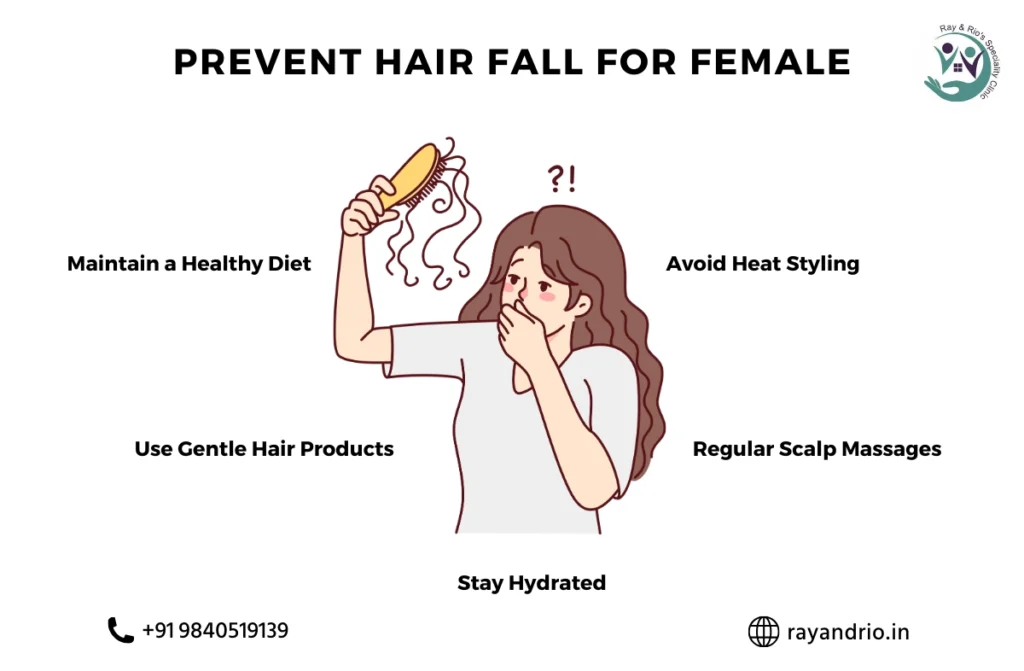How to Prevent Hair Fall for Female , Hair loss is a common problem that many women face at various stages of life. Whether it’s due to hormonal changes, stress, or poor hair care, it can take a toll on your confidence. At Ray & Rio’s Speciality Clinic, we understand how challenging it can be to manage hair fall. That’s why we’re here to provide practical tips and solutions to address this issue effectively.
What is Hair Loss in Women?
Hair loss in women refers to the excessive shedding or thinning of hair from the scalp or other parts of the body. Unlike men, women usually experience a diffuse pattern of hair loss rather than complete baldness. This condition can result from hormonal imbalances, nutritional deficiencies, or underlying medical conditions.
Common characteristics of hair loss in women include:
- Hair thinning all over the scalp.
- A wider part in the hairline.
- Excessive hair shedding during brushing or washing.
Understanding how to prevent hair fall for female is essential to addressing these challenges effectively. Hair loss can be temporary or permanent, depending on the cause. Identifying the root cause early is crucial to preventing further damage.

What Are the Types of Hair Loss in Women?
Understanding the type of hair loss you’re experiencing is essential for effective treatment. Here are some common types:
- Androgenetic Alopecia: Often called female pattern hair loss, it’s a hereditary condition that leads to gradual thinning, especially at the crown of the scalp.
- Telogen Effluvium: A temporary condition caused by stress, illness, or drastic weight loss, leading to excessive shedding.
- Alopecia Areata: An autoimmune condition where the body attacks hair follicles, resulting in patchy hair loss.
- Traction Alopecia: Caused by tight hairstyles that put stress on hair roots, leading to breakage and hair loss.
- Scarring Alopecia: A rare form of hair loss where inflammation destroys hair follicles, leaving scars.
What Are the Signs of Hair Loss in Women?
Recognizing the early signs of hair loss can make a big difference in preventing further issues:
- Excessive hair on your pillow after sleeping.
- Noticeable thinning on the scalp.
- Increased hair shedding while brushing or washing.
- Bald patches on specific areas of the scalp.
- Weak or brittle hair that breaks easily.
If you’re experiencing these symptoms, consider learning how to prevent hair fall for female effectively by consulting experts.
How to Prevent Hair Fall for Female
Preventing hair fall requires consistent effort and the right approach. Here’s how you can start:
- Maintain a Healthy Diet: A balanced diet rich in proteins, vitamins, and minerals like biotin, iron, and zinc can strengthen your hair.
- Use Gentle Hair Products: Avoid harsh shampoos and conditioners. Opt for sulfate-free products designed for your hair type.
- Stay Hydrated: Drinking enough water keeps your scalp hydrated and promotes healthy hair growth.
- Avoid Heat Styling: Excessive use of curling irons, straighteners, or blow dryers can weaken hair strands and lead to breakage.
- Regular Scalp Massages: Gently massaging your scalp with natural oils like coconut or argan oil can stimulate blood flow and promote growth.
These steps are fundamental to how to prevent hair fall for female.
How to Stop Hair Loss in Women Naturally
Natural remedies can be effective in managing hair fall. Here are some simple methods on how to stop hair loss in women naturally:
- Aloe Vera: Apply fresh aloe vera gel to your scalp to reduce irritation and promote healthy growth.
- Onion Juice: Rich in sulfur, onion juice boosts hair strength and promotes regrowth. Apply it directly to the scalp and rinse after 30 minutes.
- Green Tea Rinse: Antioxidants in green tea can improve scalp health. Use it as a rinse after shampooing.
- Fenugreek Seeds: Soak fenugreek seeds overnight, grind them into a paste, and apply to the scalp for nourishment.
- Regular Trims: Trimming split ends ensures your hair looks healthier and reduces breakage.
Including these remedies in your routine shows how to stop hair loss in women naturally with ease.
How to Prevent Female Hair Thinning
Hair thinning can be distressing, but these steps can help you understand how to prevent female hair thinning:
- Use Volumizing Shampoos: These shampoos add volume and thickness to your hair, giving it a fuller appearance.
- Avoid Tight Hairstyles: Tight ponytails or braids can strain hair roots and cause thinning.
- Scalp Treatments: Products containing minoxidil or keratin can help restore hair thickness.
- Reduce Stress: Engage in stress-relief activities like yoga or meditation to prevent hair loss triggered by stress.
- Gentle Brushing: Use a wide-tooth comb to avoid pulling or breaking hair.
Adopting these habits will show how to prevent female hair thinning over time.
10 Ways of Treating Female Hair Loss
Here are 10 proven ways to manage and treat hair loss in women:
- Medications: Over-the-counter treatments like minoxidil are effective for female pattern hair loss.
- Laser Therapy: Low-level laser treatments stimulate hair follicles.
- PRP Therapy: Platelet-rich plasma therapy involves injecting your plasma into the scalp to encourage growth.
- Hair Transplants: Surgical procedures can restore hair in areas of permanent loss.
- Balanced Diet: Ensure adequate intake of iron, biotin, and omega-3 fatty acids.
- Scalp Massages: Use oils like jojoba or argan to promote circulation.
- Anti-Dandruff Treatments: Addressing scalp conditions can reduce hair loss.
- Reduce Heat Damage: Use heat protectants when styling your hair.
- Protective Styles: Wear loose hairstyles to avoid tension.
- Seek Professional Help: A dermatologist can guide you on how to prevent hair fall for female effectively.
These methods also help to prevent female hair loss effectively.
Can Hair Loss in Women Be Prevented?
While not all hair loss is preventable, taking these measures can reduce the risk:
- Avoid chemical treatments like bleaching or perming.
- Protect your hair from sun damage by wearing a hat or scarf.
- Follow a healthy lifestyle with balanced nutrition and exercise.
- Address underlying health conditions like thyroid disorders promptly.
These tips are essential for those asking how to prevent hair fall for female effectively.
How to Prevent Hair Fall While Sleeping
Sleep plays a crucial role in maintaining healthy hair. Here are tips on how to prevent hair fall while sleeping:
- Use a Silk Pillowcase: Silk reduces friction, preventing hair breakage.
- Braid Your Hair: Loose braids can minimize tangling.
- Apply Overnight Serums: Use nourishing serums or oils before bed to strengthen your hair.
- Avoid Sleeping With Wet Hair: Damp hair is more prone to breakage, so ensure your hair is dry before sleeping.
- Sleep in a Relaxed Position: Avoid putting pressure on your scalp while sleeping.
Follow these practices for how to prevent hair fall while sleeping.
How to Control Heavy Hair Fall for a Woman
If you’re experiencing severe hair fall, these steps can help you learn how to control heavy hair fall for a woman:
- Consult a Dermatologist: Identify and treat any underlying conditions like alopecia or scalp infections.
- Switch to Mild Shampoos: Avoid harsh products that strip natural oils from your hair.
- Include Supplements: Biotin, zinc, and iron supplements can help combat heavy hair fall.
- Stay Consistent: Hair treatments often take time to show results, so don’t give up.
- Monitor Your Health: Hormonal imbalances and nutritional deficiencies can contribute to hair fall.
By staying proactive, you can understand how to control heavy hair fall for a woman better.
These steps are also critical to prevent female hair loss long term.
What Causes Hair Loss in Women?
Several factors can lead to hair loss, including:
- Hormonal Changes: Pregnancy, menopause, and thyroid disorders.
- Stress: Physical or emotional stress can push hair into the shedding phase.
- Medical Conditions: Autoimmune diseases, scalp infections, or chronic illnesses.
- Genetics: Family history of hair loss.
- Poor Hair Care: Overuse of styling tools, harsh chemicals, and tight hairstyles.
What Are the Risk Factors for Hair Loss in Women?
Certain factors increase the likelihood of hair loss:
- Family History: Genetic predisposition to androgenetic alopecia.
- Age: Hair naturally thins with age.
- Nutritional Deficiencies: Lack of essential nutrients like protein and iron.
- Medical Treatments: Chemotherapy or radiation therapy.
- Lifestyle Habits: Smoking, excessive alcohol consumption, or poor hair hygiene.
How Will a Healthcare Provider Diagnose Hair Loss in Women?
Diagnosing hair loss involves:
- Physical Examination: Checking the scalp for signs of thinning or inflammation.
- Medical History: Discussing your lifestyle, diet, and family history.
- Blood Tests: Identifying any hormonal imbalances or deficiencies.
- Scalp Biopsy: Taking a sample of scalp tissue to rule out infections.
- Pull Test: Gently pulling hair to assess the amount of shedding.
Conclusion
How to prevent hair fall for female is a question many women ask, and the answer lies in adopting the right habits and seeking timely care. At Ray & Rio’s Speciality Clinic, we specialize in offering personalized solutions to address hair loss. Whether you need natural remedies or advanced treatments, our team is here to guide you every step of the way.
Read Also : How to Stop Hair Fall of Men

